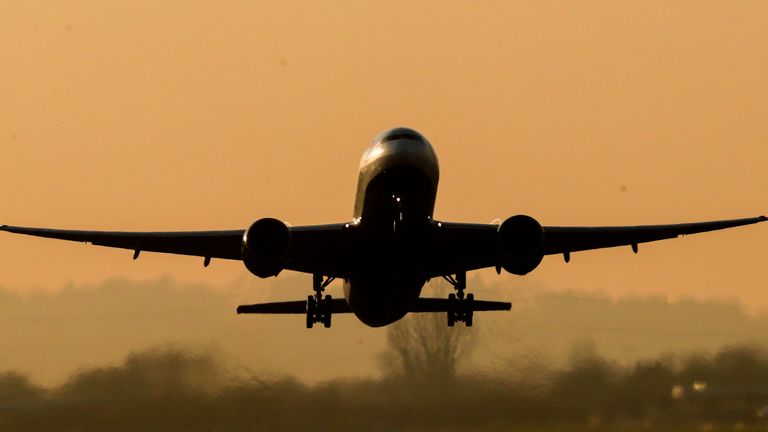
Put in purely economic terms, airport expansion is a no-brainer. Money blog: Trump's cryptocurrency crashes as critics call it worthless The economic case
The independent commission led by Sir Howard Davies, the former chairman of NatWest, and published as long ago as July 2015, concluded that "expanded airport capacity is crucial for the UK's long-term prosperity". Gatwick, according to a report prepared for the airport by the independent economic consultancy Oxera, generated £5.5bn for the economy in 2023 and supported more than 76,000 jobs.
The airport's owner estimates that expanding it to take annual capacity to 75 million by the mid-2030s, up from the £46.5m it hit in 2019, would create around 14,000 jobs and generate an extra £1bn a year in economic benefits. Those numbers are difficult to verify - but it can be stated with confidence that anything which provides access to new markets for both consumers and businesses will be positive for growth.
Expanding the smaller Luton Airport would, similarly, be positive for growth.

Read more: Water boss blames 15 years of keeping bills low for industry woes Wage growth and jobless rate rising, official figures show The airport in 2019 - these pre-pandemic numbers are probably the most reliable given the upheaval of the last few years - is estimated to have supported 16,500 jobs in the local area and contributed £1.1bn to GDP. Expansion on the airport's estimates creates up to 6,100 jobs and contributes an extra £900m to GDP. Trumping them both, of course, is Heathrow. The Davies Commission said that building a third runway to the northwest of the airport would provide for around 40 new destinations from Heathrow and would create more than 70,000 new jobs by 2050, adding some £147bn to GDP. It stated: "Heathrow is best-placed to provide the type of capacity which is most urgently required: long-haul destinations to new markets. It provides the greatest benefits for business passengers, freight operators and the broader economy." It is worth noting that among the members of the commission was Sir John Armitt, the respected former chairman of the Olympic Delivery Authority, who is now chair of the National Infrastructure Commission. His term of office was extended by Ms Reeves in October last year in order for him to oversee the 10-year strategy ordered by the chancellor and the establishment of the National Infrastructure and Service Transformation Authority. He will be an influential voice in this debate. However, while the economic case for airport expansion is unimpeachable, the bigger question, perhaps, is whether it is achievable. Political considerations Getting approval for the expansion of both Luton and Gatwick will be a major test of the new government's commitment to overhauling planning regulations where they are an impediment to growth. And here there are - for supporters of expansion - ominous signs. A decision on whether or not to expand Luton was postponed for the third time just before Christmas so that Heidi Alexander, who had just succeeded the disgraced Louise Haigh as transport secretary, could be given time to assess the application. Climate concerns Tied into the planning hurdles are the inevitable environmental objections. The Climate Change Committee, the government's independent advisory body, has already said emissions savings would have to be made elsewhere in the economy were there to be a big expansion in airport passenger numbers. The aviation industry will doubtless argue that it has already committed to becoming net zero by the middle of the century - but the environmental lobby has a long track record of successfully campaigning against airport expansion. On top of that are the political obstacles. Ms Reeves - and Ms Alexander, should she back expansion of Gatwick and Luton - will face implacable opposition from within their own cabinet, not least from Ed Miliband, the energy and climate change secretary. Backing Heathrow expansion would be more controversial still. Sadiq Khan, the London mayor, is strongly opposed to this and so are other senior Labour figures, among them Andy Burnham, the mayor of Greater Manchester. He argues that a third runway at Heathrow would run counter to levelling-up proposals - although it is worth noting here that some of the UK's biggest regional airports, such as Newcastle, support a third runway on the basis that it would boost international connectivity to their region. That means leadership will ultimately have to come from Sir Keir Starmer who, it is worth noting, voted against a third runway at Heathrow in 2018. Government unlikely to ever get credit Supporting airport expansion is often difficult for governments - quite apart from the environmental objections and the inevitable planning hurdles - because it takes so long to add capacity and ministers are therefore unlikely to receive credit for it during their political lifetime. For example, the two main airport expansion projects currently under way in Europe, the new Luis de Camoes airport in Lisbon and the new Solidarity superhub in Warsaw, are unlikely to be completed until the mid-2030s. But the latter, in particular, highlights how other European governments have no hesitation in seeing airport expansion as a major generator of growth.
It is not alone. Amsterdam's Schiphol Airport, an increasingly important competitor to Heathrow, is currently investing some €6bn in upgrades with the aim of expanding both passenger and flight numbers. Budapest, an airport once owned by BAA, the former parent of Heathrow and Gatwick, is looking to build a third terminal that would generate an extra three million passengers by the end of the decade.
These examples highlight how other European governments are less squeamish about putting airport expansion over environmental considerations in the name of pursuing economic growth.
You can be sure that the international investors who own Heathrow, Gatwick and Luton will be looking to the UK to do likewise.

Comments
Post a Comment